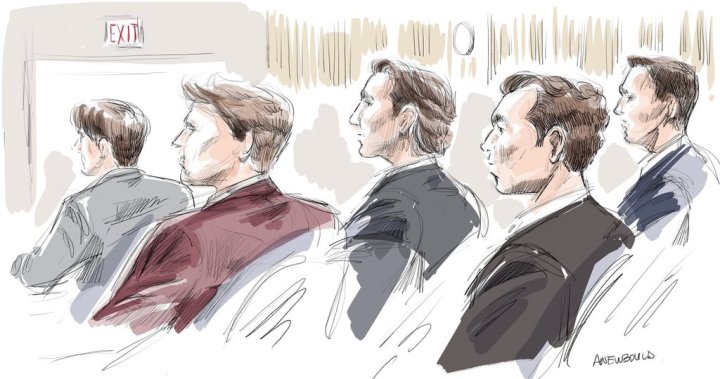Five former members of Canada’s 2018 world junior hockey team—Michael McLeod, Carter Hart, Dillon Dube, Alex Formenton, and Callan (Cal) Foote—are facing sexual assault charges stemming from an alleged incident in a London, Ontario hotel room in June 2018. All five have pleaded not guilty, with McLeod additionally charged as a party to the offence. The trial, which began in April 2025 and has featured significant legal challenges, is expected to conclude with a verdict on July 24, 2025. The case has drawn widespread public attention due to the high-profile defendants and its implications for issues surrounding consent, institutional accountability, and the culture within Canadian elite hockey.
Details of the Allegations and Charges
The trial centers on an alleged sexual assault that took place in a hotel room in London, Ontario, during the 2018 World Junior Hockey Championship. The complainant has accused five players from Canada’s 2018 team—Michael McLeod, Carter Hart, Dillon Dube, Alex Formenton, and Callan Foote—of involvement in the incident. McLeod faces additional charges as a party to the offence, while the others are charged directly. All defendants have entered pleas of not guilty and deny the allegations.
Legal Proceedings and Challenges
The trial commenced in April 2025 and has involved complex legal arguments and evidentiary challenges. Over the months, both prosecution and defense teams have presented extensive testimony, forensic evidence, and character assessments. The proceedings have included discussions on consent, the reliability of witness accounts, and the interpretation of actions under Canadian law. The defense has argued against the credibility of key evidence, while the prosecution has focused on establishing the context and sequence of events leading to the alleged assault.
Impact on Canadian Hockey and Public Discourse
This case has galvanized public discourse around the culture of elite sport in Canada, especially concerning athlete behavior and institutional oversight. Critics have raised questions about the responsibility of sports organizations to prevent and respond to misconduct. Hockey Canada, the governing body of the sport, has come under scrutiny for its role in addressing allegations and promoting player accountability. The trial’s high-profile nature has also brought renewed focus on broader issues of consent and gender-based violence within sports environments.
Upcoming Verdict and Potential Consequences
The jury is scheduled to deliver its verdict on July 24, 2025. The decision will mark a significant moment not only for the individuals involved but also for Canadian sports culture and legal precedent concerning sexual assault allegations in high-profile contexts. Should convictions occur, the ramifications may include legal penalties for the accused and likely influence reforms in athlete conduct policies and institutional governance within hockey organizations.
Summary
- Five former teammates from Canada’s 2018 World Junior Hockey team are on trial for alleged sexual assault from June 2018.
- All defendants plead not guilty; trial opened in April 2025, concluding with a verdict expected in July 2025.
- Case highlights issues of consent, institutional accountability, and sports culture in Canada.
- The trial has prompted wider discussions on athlete conduct and governing body responsibilities.
The trial involving five former members of Canada’s 2018 world junior hockey team represents a pivotal moment in addressing serious allegations of sexual assault within elite sports. As the justice system examines the evidence and testimonies, the forthcoming verdict will not only determine the legal outcomes for the accused but also potentially influence public policy and organizational practices in Canadian hockey. This case underscores the continuing importance of fostering a culture of accountability, respect, and safety in sports environments, while contributing to the national dialogue on consent and institutional responsibility.

